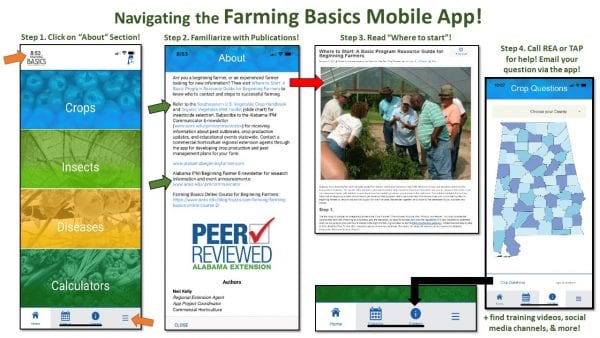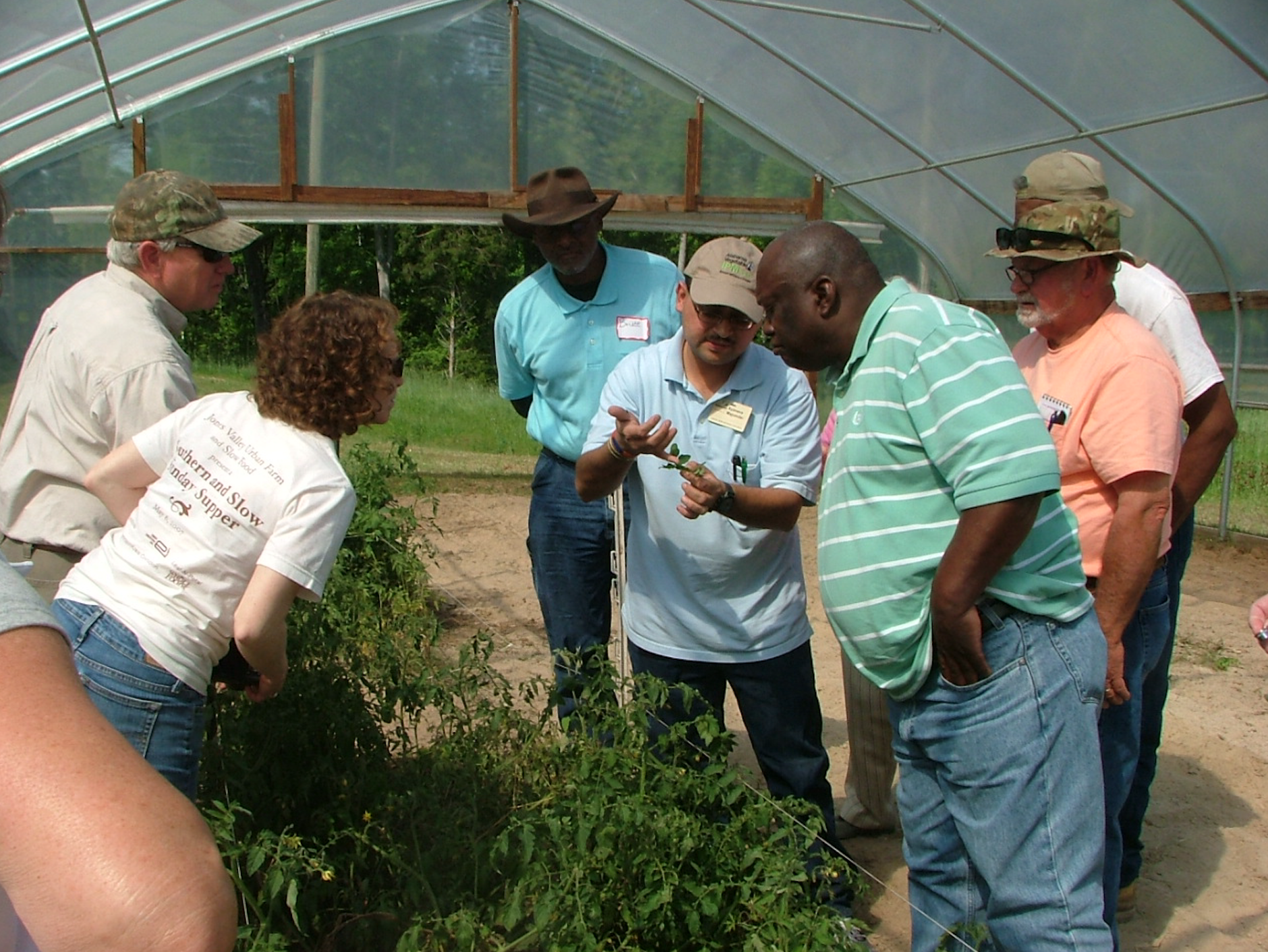Farming

Alabama has a booming fruit and vegetable production industry which generates more than $160 million in revenue and provides employment to thousands of residents. The growth in the industry is also representative of the growth in local food movement and organic farming in the South. If you are a beginning farmer with ambition to grow food crops for clientele you know, you’ve come to the right place. This bulletin highlights the first few steps that all beginning farmers should take to get started in their business. Below are some steps that have evolved into a consistent system for beginning farmers to network and and find support for over five years. Remember, together we do more for the betterment of your business and society.
Step 1
The first thing to consider as a beginning farmer is the “Four P model.” This includes purpose, plan, product, and people. You must consider the opportunities and risks of farming as a business, plan the resources you need for success and know the regulations. It is also important to determine what you are going to grow and how to market to the right clientele. A great place to start is https://newfarmers.usda.gov/. It helps farmers step-by-step to think about the Four Ps and other important aspects of running a business. Eventually, the steps will connect you to resources in Alabama Cooperative Extension System (Step 2). If you are a military veteran interested in farming, www.operation-grow.com provides unique training and networking opportunities for you.
Step 2
Congratulations on thinking through your new farming business. It is now time to connect to local resources and make new friends. Bookmark the website AlabamaBeginningFarmer.com and explore the various ADA-compliant resources listed below. These peer-reviewed resources are not only for providing technical information, but to also network with our knowledgeable team of regional Extension agents (REAs) and Extension specialists. Also, seek out on-farm assistance from Technical Assistance Providers (TAPs) in the network. Contact information can be found below. Search REAs and TAPs on the internet or use the Farming Basics Phone app for immediate assistance.
- The Farming Basics Mobile App, available for both Apple and Android phones, is a critical resource that stays with you all the time. Check the learning steps for the app in the figure at the end. Currently it has information on all major fruit and vegetable crops grown in Alabama along with their frequent disease and insect pest issues. The app provides information on USDA market prices and news alerts by connecting you to our social media public news channel. You can also choose your county which automatically brings up all the Commercial Horticulture REA contact information for that area. You can ask us questions through the app and social media pages. If you love watching short educational videos on YouTube to stay informed of major farm topics, then the app connects to the Beginning Farmer Project video channel or you can independently find the training videos on the Alabama Extension Youtube channel. Visit the Alabama Extension website for information on where to download the app.
- The Farming Basics Online Course is a four-hour curriculum with narrative, printable text pages, and hyperlinks that anyone can complete from the comfort of their home. This curriculum generates a customized certificate of completion that provides four continuing education units (CEUs) from the American Agronomy Society and the American Society for Horticultural Science. Beginning Farmers seeking on-farm assistance from the Alabama BFRD program at Auburn University must have this certificate on file before they approach TAPs and REAs. Taking the course provides much-needed introduction to basic crop production and pest management, marketing and food safety regulatory information which saves effort when you are ready for on-farm help. Also check out the Food Safety Online Course, Beef Basics Online Course, and the Forage Basics Online Course for your training needs. Enroll in the course here.
- The Alabama IPM/ Sustainable AG E-newsletter is a year-round newsletter including something from everyone. This digital publication is distributed twice a month with links to blog articles, major news stories, and educational events statewide in a mobile-friendly format. Subscribe to the newsletter by visiting the web page. Read through the online archive and social media channels to stay abreast of recent advances in agriculture. Make sure you add yourself to the email contact list of your local county office and the regional Extension agent so that you don’t miss out on hands-on training opportunities.
- Commercial Horticulture Distance Education Series. Are you looking for something to do during or after-hours for self-improvement from the comfort of your home? Look into these major online distance-learning resources. These are free events open to all beginning and experienced farmers, educators, gardeners, and other professionals. All times are in Central Standard Time. This series includes COVID-19 special programs for producers.
- Monthly Webinar Series. This series occurs the last Monday of each month from 9 to 10 a.m. and are open to the public. Zoom link to join
- The Alabama Virtual Farm Tours are a great way to learn about farming from mentor farmers from the comfort of your home. These tours occur monthly on Thursdays from 5 p.m. to 6 p.m. Watch it live on the Alabama Extension Commercial Horticulture Facebook page.
The archive for all online events listed above can be found on the Digital Commercial Horticulture Resources web page.

Navigating the Farming Basics Mobile App Step 1. Click on “About” Section Step 2. Familiarize with Publications Step 3. Read “Where to start” Step 4. Call REA or TAP for help. Email your questions via the app. Find training videos, social media channels, and more.
Step 3
Looking for funding opportunities for farm businesses. The Natural Resources Conservation Service (NRCS) and Farm Service Agency (FSA) provide various kinds of financial assistance or loan packages for beginning and experienced farmers. Contact the agency directly using the links or contact a TAP to help you understand the regulations.
Step 4
Get help on your farm! Once you have familiarized yourself with online resources, completed the Farming Basics Online Course, and done some thinking on the 4Ps – then you are ready for an on-site visit from your friends in Alabama Extension. Both REAs and TAPs receive many hours of annual technical training from universities and national agencies to stay abreast of the latest information and local regulations making them invaluable both on and off the farm. REAs can provide research-based production information and connect you to the researchers directly for rapid assessment and resolution of crop issues. Use the Farming Basics Mobile App to find REA information and connect with an REA via the app.
Partnerships are available with NGOs for on-farm assistance. Many nongovernmental organizations (NGOs) within Alabama are helping beginning farmers with their preliminary needs in collaboration with Alabama Extension’s Commercial Horticulture Team. Together this forms the “Farm Community Cluster” model funded by two USDA BFRD grants (2015-present) and several Alabama Department of Agriculture and Industries Specialty Crops block grants. Growers needing help with extensive paperwork and consultation for farm business development, NRCS programs, organic certification and such, please contact Farmscape Solutions (334-740-8515, jayme@farmscapesolutions.com), Crotovina Inc. (256-520-2400, karen@crotovina.com), Tony Glover (gloveta@aces.edu, 205-568-0005), Rachel Dawsy (North Alabama Agriplex Director, 256-297-1044), and The United Christian Community Association (TUCCA, 334-216-1344, williamsandrew1976@gmail.com). Check the contact information for NGOs online and connect with them.
USDA Rural Development Updates
USDA Rural Development is a federal agency that specializes in economic development and community development in rural America. Rural Development’s intersection with farmers often deals with agribusiness. Through our Rural Energy for America Program, USDA provides guaranteed loan financing and grant funding to agricultural producers and rural small businesses for renewable energy systems or to make energy efficiency improvements. Agricultural producers may also apply for new energy efficient equipment and new system loans for agricultural production and processing. Through the Value-Added Producer Grant program, USDA helps agricultural producers enter into value-added activities related to the processing and marketing of new products.
The goals of this program are to generate new products, create and expand marketing opportunities and increase producer income. Through the Meat and Poultry Processing Expansion Program, grants are provided to help eligible processors expand their capacity. USDA Rural Development designed the Meat and Poultry Processing Expansion Program (MPPEP) to encourage competition and help to ensure the security of the food supply chain. The Food Supply Chain Guaranteed Loan Program is a part of USDA’s Build Back Better initiative to strengthen critical supply chains and the U.S. food system. This program guarantees loans of up to $40 million for qualified lenders to finance food systems projects, specifically for the start-up or expansion of activities in the middle of the food supply chain. For more information, visit rd.usda.gov/al.
The Alabama Beginning Farmer Program, Operation Grow Project, Alabama SARE, and Alabama IPM activities and publications are funded by many grants from the Alabama Department of Agriculture and Industries Specialty Crops Block Grant, USDA-SARE, USDA-OREI, USDA-NIFA CPPM, and USDA Beginning Farmer and Rancher Development Programs. Thank you to all our funding agencies and program partners.

